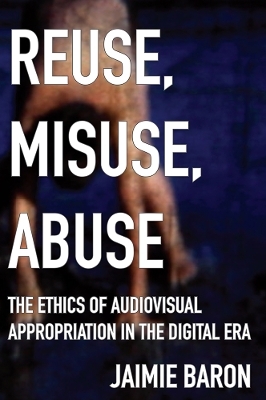
Reuse, Misuse, Abuse
The Ethics of Audiovisual Appropriation in the Digital Era
Seiten
2020
Rutgers University Press (Verlag)
978-0-8135-9927-4 (ISBN)
Rutgers University Press (Verlag)
978-0-8135-9927-4 (ISBN)
In contemporary culture, existing audiovisual recordings are constantly reused and repurposed for various ends, raising questions regarding the ethics of such appropriations. Reuse, Misuse and Abuse surveys a range of contemporary films and videos that appropriate preexisting footage and attempts to theorize their ethical implications.
In contemporary culture, existing audiovisual recordings are constantly reused and repurposed for various ends, raising questions regarding the ethics of such appropriations, particularly when the recording depicts actual people and events. Every reuse of a preexisting recording is, on some level, a misuse in that it was not intended or at least anticipated by the original maker, but not all misuses are necessarily unethical. In fact, there are many instances of productive misuse that seem justified. At the same time, there are other instances in which the misuse shades into abuse. Documentary scholars have long engaged with the question of the ethical responsibility of documentary makers in relation to their subjects. But what happens when this responsibility is set at a remove, when the recording already exists for the taking and repurposing? Reuse, Misuse and Abuse surveys a range of contemporary films and videos that appropriate preexisting footage and attempts to theorize their ethical implications.
In contemporary culture, existing audiovisual recordings are constantly reused and repurposed for various ends, raising questions regarding the ethics of such appropriations, particularly when the recording depicts actual people and events. Every reuse of a preexisting recording is, on some level, a misuse in that it was not intended or at least anticipated by the original maker, but not all misuses are necessarily unethical. In fact, there are many instances of productive misuse that seem justified. At the same time, there are other instances in which the misuse shades into abuse. Documentary scholars have long engaged with the question of the ethical responsibility of documentary makers in relation to their subjects. But what happens when this responsibility is set at a remove, when the recording already exists for the taking and repurposing? Reuse, Misuse and Abuse surveys a range of contemporary films and videos that appropriate preexisting footage and attempts to theorize their ethical implications.
JAIMIE BARON is an associate professor of film studies at the University of Alberta. She is the author of The Archive Effect: Found Footage and the Audiovisual Experience of History and numerous journal articles and book chapters. She is the director of the Festival of (In)appropriation and co-editor of Docalogue.
Contents
Introduction Reuse, Misuse, Abuse
1 (Re)exposing Intimate Traces
2 Speaking through Others
3 Dislocating the Hegemonic Gaze
4 Reframing the Perpetrator’s Gaze
5 Abusing Images
Filmography
Acknowledgements
Bibliography
Index
| Erscheinungsdatum | 28.04.2021 |
|---|---|
| Zusatzinfo | 10 b-w images |
| Verlagsort | New Brunswick NJ |
| Sprache | englisch |
| Maße | 152 x 229 mm |
| Gewicht | 454 g |
| Themenwelt | Kunst / Musik / Theater ► Film / TV |
| Geisteswissenschaften ► Philosophie ► Ethik | |
| Sozialwissenschaften ► Kommunikation / Medien ► Medienwissenschaft | |
| ISBN-10 | 0-8135-9927-X / 081359927X |
| ISBN-13 | 978-0-8135-9927-4 / 9780813599274 |
| Zustand | Neuware |
| Haben Sie eine Frage zum Produkt? |
Mehr entdecken
aus dem Bereich
aus dem Bereich
unsere kollektive Verantwortung
Buch | Hardcover (2023)
wbg Theiss in Wissenschaftliche Buchgesellschaft (WBG) (Verlag)
35,00 €


